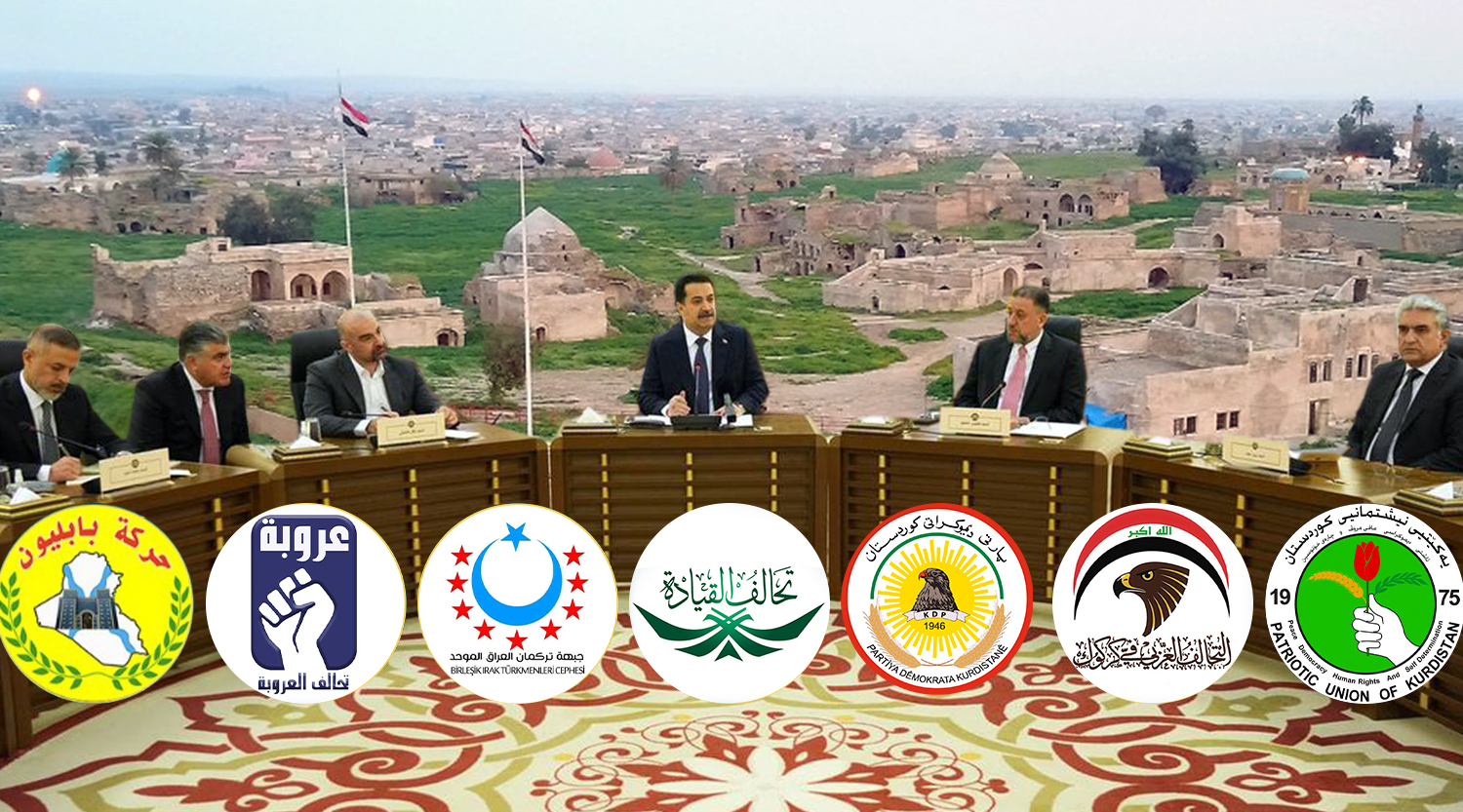The winning factions in the Kirkuk elections have not agreed on a joint proposal to form a local government and each insists on taking the post of governor, while the legal period has passed and the prime minister's leave is coming to an end.
Iraqi Prime Minister Mohammed Shia Sudani on February 21 chaired a meeting of all the winning factions in Kirkuk and gave them until March 3 to prepare their proposals and demands for the formation of a new administration in the province, to form a joint local government.
So far, according to KirkukNow follow-up, there are more than three different proposals for the distribution of senior posts in Kirkuk, and have been discussed informally between the parties.
Nashat Shahwez, a member of the Kirkuk provincial council from the Patriotic Union of Kurdistan PUK faction, told KirkukNow that the next meeting of the parties with PM Sudani is scheduled for March 3 and each party will prepare its project for the new administration and how should be formed soon.
"Everyone is excited for the first council meeting, but we have different perspectives.”
The intensification of the meetings and efforts of the Premier followed the dispute between the factions of the Kirkuk provincial council, which has not held the first meeting yet and the formation of the new administration has been disrupted, although according to law the first meeting should have been held on February 16, two weeks after approval of the results for December 18 Provincial Council Elections.
According to the amended Iraqi Provincial Law No. 21 of 2008, the council must elect the governor and two deputies within 30 days from the date of its first session.
Only eight out of 16 members of the new Kirkuk provincial council were present at the first meeting on February 5th thus meeting was not held for lack of quorum.
The first meeting was attended by five members of the PUK and two members of the council from the Kurdistan Democratic Party (KDP) faction, and the only member quota seat for the Christian community from the Babylon list.
According to the law, nine out of 16 members of the Kirkuk council must be present to convene and elect local government posts.
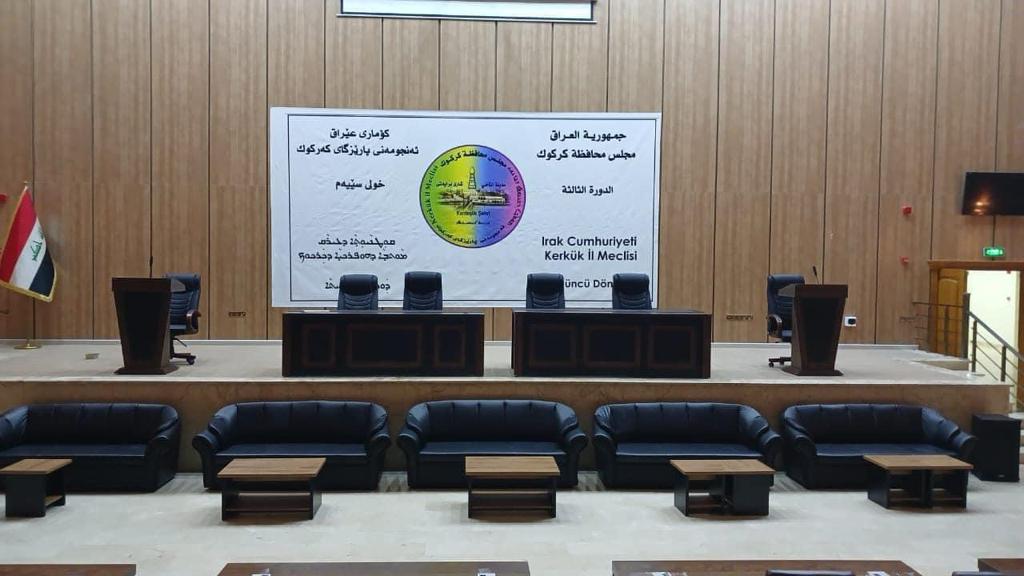
Hall allocated for the first meeting of the new provincial council, Kirkuk, 2024. Media of Kirkuk Provincial Council
"Of course, the distribution of posts must be fair based on the election results," Mohammed Ibrahim, a member of the Kirkuk provincial council from the leadership faction, told KirkukNow.
One of the proposals for the formation of the Kirkuk administration is governor's post to be given to the Kurds and among the Kurds to the PUK, and the post of provincial council speaker to the Arabs. For the mayor of central Kirkuk, deputy governor, and deputy for the head of the provincial council, priority is for the Turkmen and KDP candidate, which seems more like a Kurdish proposal.
"As the PUK, we are in favor of a partnership agreement that no community should be marginalized, but the issue of posts is the achievement of the election results, so we consider PUK worthy of the governor's post," he said.
There has been a constant dispute between the PUK and KDP over the division of power in Kirkuk from 2017 to July 2019, which prevented them from regaining the governor's post.
Shokhan Hasib, a member of the Kirkuk provincial council from the (KDP) faction, said the governor's post should be for a neutral and loyal Kurd who cares about Kirkuk.
“Each party presents its project in the next meeting on March 3.”
The Kurdish parties with seven seats, including the PUK, which has five seats, consider the governor's post its right, while the Arabs with (six seats), especially the Arab coalition led by current acting governor Rakan Saeed, which won three seats, is trying to stay at office.
Another proposal for the distribution of posts in Kirkuk, which is supported by the Arabs, is each of the posts of the governor and speaker of the council in two years, that is, two years for Kurds and two years for Arabs and the same for the head of the provincial council.
The northern, oil-rich city of Kirkuk, is home to about 1.77 million Kurds, Turkmen, and Arabs. Located 238 kilometers north of Baghdad, Kirkuk is an ethnically mixed province and has long been at the center of disputes between the federal government in Baghdad and the Kurdistan Regional Government KRG.
The highest legislative and supervisory authority within the boundaries of the governorate administration shall be with the Council, which has the right to issue internal laws and instructions for managing the affairs of the governorate, formulate the general policy of the governorate, discuss and approve the governorate’s budget and project plans.
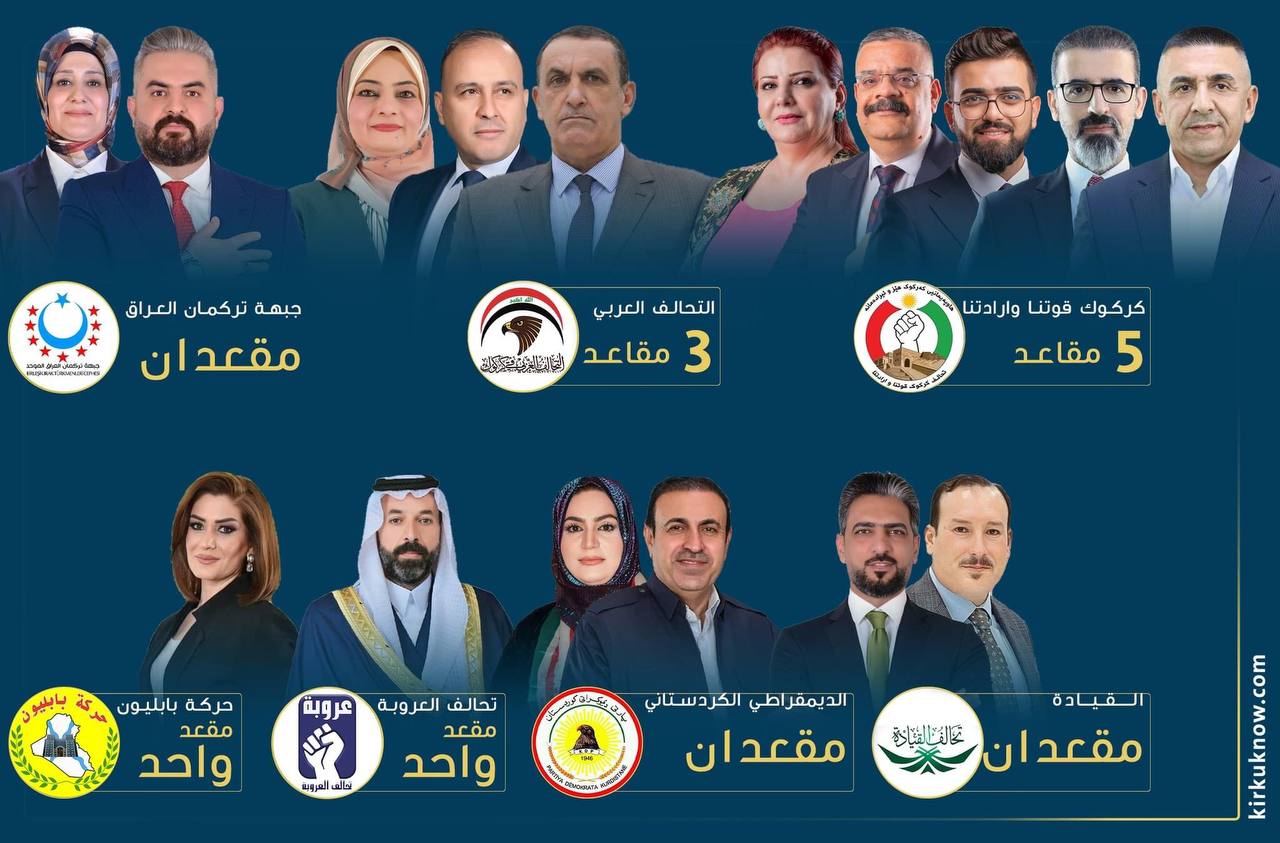
Elected members of the Kirkuk Provincial Council
Mohammed Ibrahim said that in addition to the Prime Minister meeting, the parties had two meetings, including a joint meeting at the house of Arab figure Anwar Aasi.
"As the leadership list, we had a meeting in Erbil with Mr. Massoud Barzani so that everyone can present their projects.”
So far, only the Turkmen have officially announced their proposal for the formation of the Kirkuk administration, which has become one of the proposals being discussed and calls for the exchange of senior positions among Kirkuk ethnicities, without specifying any date for the exchange, like the governor's post should be exchanged three times between Kurds, Arabs, and Turkmen.
The two-seat Iraqi Turkmen Front ITF is calling for a Turkmen governor this time, according to more than one statement or official statement issued by the party after the election.
Ahmad Ramzi, a member of the Kirkuk provincial council from the ITF faction, told KirkukNow they insist on handing over the governor's post among Kirkuk ethnicities because they believe that whoever holds the post and any services provided in Kirkuk will be the achievement of the governor.
He said each faction is scheduled to present its proposal for a solution at the March 3 meeting, without ignoring any side, so as not to repeat "the mistakes of the past.”
"We will present the project at the next meeting," Ramzi said. "Those who accepted the project were within the framework of the Turkmen negotiations.”
Turkmen, the third largest ethnic group in Iraq after Arabs and Kurds, are spread across the country, residing almost exclusively in the northern towns and villages stretching from Tal Afar through Mosul, Erbil, Altun Kopri, Kirkuk, Tuz Khurmatu, Kifri and Khanaqin. They are all Muslims, half Sunnis and half Shiites.
Power in Kirkuk will be distributed according to fair representation, which guarantees the participation of the communities of the province regardless of the election results, as stated in Article 35 of the Provincial Council Election Law No. 12 of 2018 as amended.
Without this provision, the parties belonging to any ethnic group in Kirkuk, do not have enough seats to decide the new local administrative positions in the council alone, because the highest positions, especially the governor, speaker, and deputies will be elected by 50 + 1, which means that they must get nine votes out of the 16 members of the Kirkuk council.
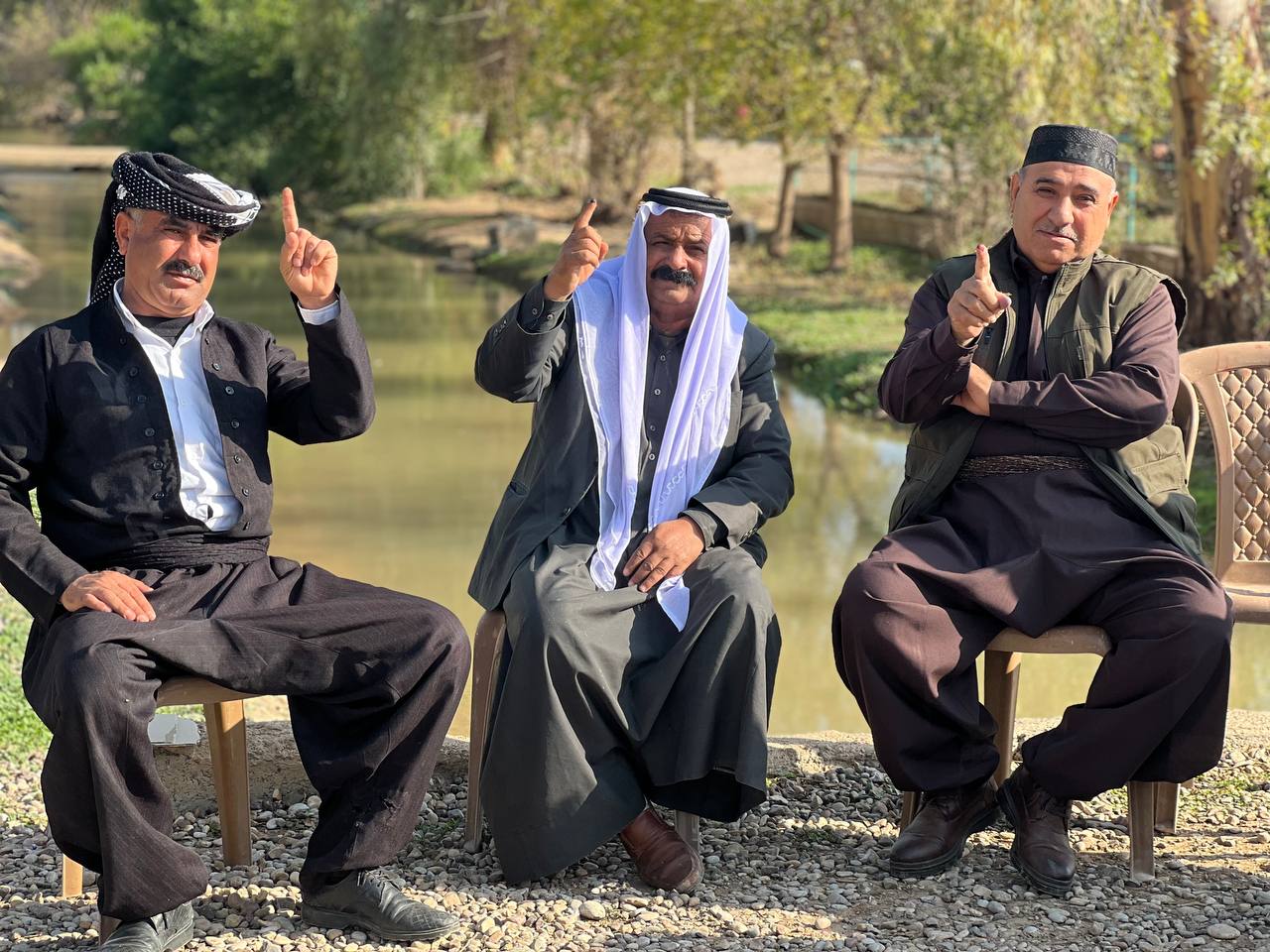
Three citizens of Daquq after voting for the provincial council, Kirkuk, December 2023. KirkukNow
Shahwez said the ITF’s project has not been officially given to the PUK, but at the meeting at Anwar Aasi's house, "an important meeting was held to bring the parties closer together. We as PUK and the Christians were ready for the provincial council meeting.”
“We have heard that Arabs also are committed to holding the meeting with the Prime Minister.”
The member of the council from the PUK faction believes the obstacle to the council meeting is the demands of the parties which hope to be resolved.
“Besides, the foreign interference in Kirkuk affairs is clear."
According to information received by KirkukNow, Sudani insisted on an agreement to form a local government in Kirkuk, as he interpreted the elections in the province as an achievement of his cabinet and is not ready to face failure.
An item on the agenda of the Iraqi government chaired by Mohammed Shia Sudani, which was approved by parliament in 2022, was about the elections of the Kirkuk provincial council along with other Iraqi provinces. Kirkuk only held council elections in 2005 and has been deprived of this right since then due to conflicts between the parties.
Shokhan Hasib, the KDP member of Kirkuk council, said the only joint meeting of the factions was at Anwar Aasi's house following the meeting with Sudani, so they are waiting for the next meeting on March 3 to discuss the parties' project.”
"The PUK considers the governor's post as its right, and they want it to be a loyal PUK, but they can negotiate on this because we Kurds in Kirkuk have not been able to meet the demands of our people in the Provincial Council. But still, it is better than appointing an Arab governor.”
Dozens of senior administrative posts in Kirkuk province are to be redistributed among the communities, most of which are currently managed by acting officials, including the provincial council speaker and his deputy, the governor and two deputies and assistants, four district mayors, 16 sub-district directors, and several general directors.
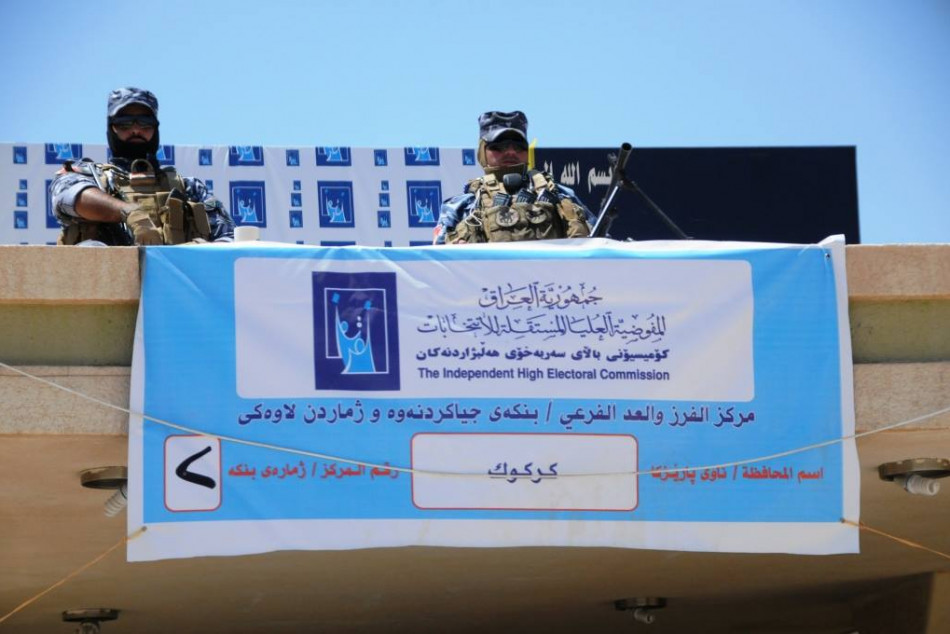
Since 2003, 32 percent of the administrative posts in Kirkuk have been allocated to Kurds, Arabs and Turkmens, and 4 percent to Christians, based on a project by former Iraqi President Jalal Talabani and the late PUK secretary. The project was agreed upon in July 2009 by the Kirkuk provincial council.
According to the 2009 agreement signed by the three main communities of Kirkuk and Christians in the Kirkuk provincial council, the post of governor was for the Kurds, the deputy governor for the Arabs, and the speaker of the provincial council for the Turkmen and four percent for the Christians.
However, the agreement was implemented only for the posts of governor, deputy governor and speaker of the council and did not extend to the lower posts.
Previously, during the Ba'ath regime, most of the main nodes of administration and governance in Kirkuk were in the hands of the Arab community, without any elections, and after 2003, the Kurds were at the peak of executive power until 2017.
The first governor of Kirkuk after the 2005 provincial council elections was Abdulrahman Mustafa from the Kurdish side. In 2011, Najmaddin Karim was elected governor from the Kurdish/PUK side by the same council.
The post of governor has been returned to the Arab community for more than six years, after Rakan Saeed Juburi, the deputy governor, was appointed at the end of March In February 2017, he was appointed acting governor of Kirkuk by Iraqi Prime Minister Haider al-Abadi.
The entire province of Kirkuk, home to 1.77 million people) is a disputed area between the two federal governments of Iraq and the Kurdistan Region, and the decision of its fate is within the framework of Article 140 of the constitution through three stages.

